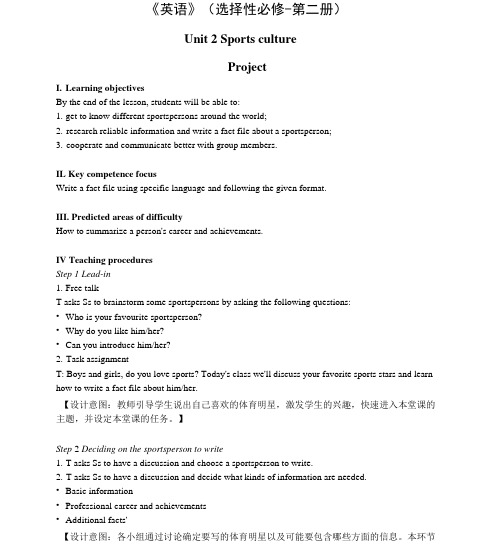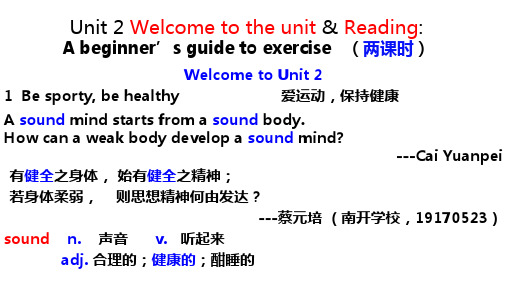高中译林牛津英语模块二Unit2教案
- 格式:docx
- 大小:103.82 KB
- 文档页数:13

模块2 unit 2 Wish you were herePeriod 3 (Task & Project)1.教材分析(1)三维目标Knowledge and skills:1.Train students' listening, speaking, reading and writing abilities.2.Learn some useful skills about learning English.3.Get the students to talk about planning a holiday and making a travel leafle t.4. Get the students to write an e-mail.5. Draw conclusions and make recommendations through the statistics.Process and methods1.Questions-and-answer activity2.Individual, pair or group work to make every student work in class.3.Listening, reading and writingEmotion, attitude and values1.Encourage Ss to take part in the tasks2.Help students to develop the ability of cooperative learning3.Improve the students’ ability to finish the tasks.(2)教学重点1. Finish the task of listening to improve the students’ listening ability.2. Finish the task of choosing a holiday destination to train the Ss’speaking ability.3. Finish the task of writing an e-mail.4. Finish the task of making a travel leaflet to train the students’ speaking ability.5. Get the students to cooperate with others.(3)教学难点1. How to t rain the students’ listening and speaking abilities.2. How to help the students finish the talks of writing and speaking.(4)教学建议1.Encourage the students to work in pairs or in groups.2.Apply multimedia to teaching新课导入设计Review the Grammar by doing the following exercises:1.He has been writing the composition the whole morning and he still ________.A.has beenB.doesC.hasD.is2.If city noises ________ from increasing,people ________ shout to be heard even at the dinner table 20 years from now.A.are not kept; will have toB.are not kept; have toC.do not keep; will have toD.do not keep; have to3.The price ________,but I doubt whether it will remain so.A.went downB.will go downC.has gone downD.was going down4.—How long ________ each other before they ________ married?—For about a year.A.have they known; getB.did they know; getC.do they know; are going to getD.had they known; got5.You can’t move in right now.The house ________.A.has paintedB.is paintedC.is being paintedD.is paintingKEYS: DACDC。

《英语》(选择性必修-第二册)Unit 2 Sports cultureProjectI.Learning objectivesBy the end of the lesson, students will be able to:1.get to know different sportspersons around the world;2.research reliable information and write a fact file about a sportsperson;3.cooperate and communicate better with group members.IL Key competence focusWrite a fact file using specific language and following the given format.III. Predicted areas of difficultyHow to summarize a person's career and achievements.IV Teaching proceduresStep 1 Lead-in1.Free talkT asks Ss to brainstorm some sportspersons by asking the following questions:•Who is your favourite sportsperson?•Why do you like him/her?•Can you introduce him/her?2.Task assignmentT: Boys and girls, do you love sports? Today's class we'll discuss your favorite sports stars and learn how to write a fact file about him/her.【设计意图:教师引导学生说出自己喜欢的体育明星,激发学生的兴趣,快速进入本堂课的主题,并设定本堂课的任务。

英语ⅰ译林牛津版unit2period8~9精品教案整体设计教材分析Thepurposeofthisteachingperiodistotrainthestudents’listeningability,speakingabilityandwritingability,aswellasreadingability.What’smore,studentscanalsolearnthepracticalabilitytoknowhowtopresentadialogue.Thisse ctionconsistsofaseriesofactivities,whichprovidestudentswithopportunitiestopract icetheirlanguageskillsoflistening,reading,speakingandwriting.Itismadeupofthreek indsofskillbuilding,includingunderstandingtonesinspokenEnglish,readingforthegis tandwritingadialogue.Besides,thereisalsoaskillbuildingactivityineachstep.Throug hthethreesteps,studentswilllearntosolveapracticalproblemintheirdailylife,thatis ,howtopresentadialogueproperly.Teacherscanalsodividethetaskintothreepartsforthreeteachingperiodsaccordingt othestudents’ability.Inthefirstperiod,teacherscanfocusonlisteningskilltotrainthestudentshowt ounderstandtonesinspokenEnglish.Inthesecondperiod,theteachingimportantpointisto trainthestudents’readingabilitytoenablethestudentstohowtounderstandthegistorthemainpointbyfastre ading.Inthethirdteachingperiod,teachersareadvisedtoputanemphasisontrainingwriti ngability.Letthestudentsknowhowtowriteadialogueandwhattheyshouldpayattentiontow hilepresentingadialogue.Theteachingimportantanddifficultpointistohelpthestudent slearnhowtowriteadialogueproperly.Ifthestudentshaveahighlevel,teachersareadvise dtospendoneteachingperiodfinishingthetask.Ifnecessary,teacherscanpreparemorelis teningmaterialstoreachthegoaltoimprovestudents’listeningability.Astospeakingandreadingabilities,theteacherhadbetterencourageal lthestudentstotakepartinclass-activities.Whilepreparingtopicsorsituations,tryto choosetheonesthatstudentsareinterestedinandensureeverystudenttohaveachancetospe akanddiscuss.三维目标Tohelpthestudentstolearnaboutsomethingonhowtopresentadialogueproperly.ToenablethestudentstolearnhowtonesareusedinspokenEnglishtoexpressdifferentf eelings.Tohelpthestudentstolearnhowtoreadforgistorthemainpoints.Toenablethestudentstowriteandpresentadialogue.Tohelpthethestudentslearnhowtounderstandthefeelingsofspeakersandhowtopresen tadialogue.重点难点1.Tohelpstudentslearnhowtojudgethespeakers’feelingsfromtheirfalling,risingandflattones.2.Toletstudentslearnhowtoreadforgistormainpoints.3.Tohelpstudentstellthespeakers’feelingtoimprovetheirlisteningability.4.Tohelpstudentsmasterthereadingability—readingforgist.5.Tomakestudentsknowabouthowtopresentadialogueproperly.教学方法1.Listeningtotapeandansweringsomequestions.2.Discussioninpairsoringroups.3.Task-basedin-classactivities.4.Explanationofsomelanguagepoints.教具预备Ataperecorderandthemultimedia.课前预备1.Askstudentstoconsiderthefollowingthreequestions:WhatpartdotonesplayinspokenEnglish?Whyisbeingabletounderstandthegistorthemainpointconsideredtobethemostimporta ntpartofreading?Whatpointsshouldbekeptinmindwhenwewriteadialogue?2.Ifpossible,teacherscanpreparesomewonderfuldialoguesinsomefilmsandletthest udentslistentothemandtellthespeakers’feelingsaccordingtotheirdifferenttones.3.Beforeclass,askthestudentstogooverhowtousearelativepronounproperly.教学过程→Step1GreetingWhilegreeting,teacherscanintendtousesomeexpressionswithattributiveclauses.T eacherscanalsoencouragestudentstoanswersomeeverydayEnglishwithattributiveclause s.→Step2RevisionCheckthehomeworkandreviewtheusageofrelativeadverbs.Theimportantteachingaimo flastteachingperiodistoknowhowtousearelativeadverbproperly.Letstudentsrecallthe definitionofarelativeclause.TherelativeadverbsofEnglishare:when,where,why.Teach ersshouldoffersomepracticetostudentstogooverinwhatconditionwhen,whereandwhyareu sedtointroduceattributiveclausesandwhen,whereandwhycanbereplacedbyapreposition+ whichinformalEnglish.Afterthat,askstudentstofinishthefollowingexercises.1.Fillintheblankswithproperprepositiontocompletethesentences.1)Heistheman_____________youshouldgiveyourthanks.2)Thefarm_____________whichweworkedtenyearsagoisn’twhatitusedtobe.3)Thisisthetree_____________whichweusedtoplaygames.4)Thehunter,_____________whomatigerwasshot,hasbeenpunished.5)WuDong,_____________whomIwenttotheconcert,enjoyeditverymuch.6)Thepen_____________whichheiswritingnowwasbroughtyesterday.7)Thegas_____________whichwecannotliveiscalledoxygen.8)Thelittlecreature_____________whichscientistsareinterestedisknownasET.pletethefollowingsentencesusingwhich,why,whereorwhen.1)Hangzhouistheplace_____________Iwentformyholidaylastsummer.2)Hereadthebook_____________hissisterhadtoldhimabout.3)Thereason_____________Peterissohappyisthathepassedtheexam.4)Iremembertheday_____________myfatherdied.Iwasonlytenyearsoldatthattime.5)Pleasegivemethereason_____________youwerelatethistime.6)Iwillgobacktotheplace_____________Igrewupandlivethereforever.3.Rewritethefollowingsentencesusingwhere,which,when,orwhy.1)TheschoolyearstartsonthefirstdayofSeptember.ThefirstdayofSeptember______________________.2)Mybrotherstoppedsmokingbecauseitisbadforhishealth.Thereason______________________.3)WewenttoShanghaionourschooltrip.Thecity______________________.4)ImostlikethelatenightshowonTV.TheTVprogram______________________.5)Myfatherworksinafactorythatmakestelephones.Thefactory______________________.6)Shedidherhomeworkinthisroom.Thisis______________________.Suggestedanswers:1.1)to2)on3)under4)by5)with6)with7)without8)in2.1)where2)which3)why4)when5)why6)where3.1)TheschoolyearstartsonthefirstdayofSeptember.ThefirstdayofSeptemberisthedaywhentheschoolyearstarts.2)Mybrotherstoppedsmokingbecauseitisbadforhishealth.Thereasonwhymybrotherstoppedsmokingisbadforhishealth.3)WewenttoShanghaionourschooltrip.ThecitywherewewenttoonourschooltripwasShanghai.4)ImostlikethelatenightshowonTV.TheTVprogramwhichImostlikeisthelatenightshow.5)Myfatherworksinafactorythatmakestelephones.Thefactorywheremyfatherworksmakestelephones.6)Shedidherhomeworkinthisroom.Thisistheroomwhereshedidherhomework.→Step3Listeningtoaradiophone-inprogramActivity1Lead-inBrainstorming:Askstudentsthefollowingquestion:Howcanweknowthespeaker’sfeelingandrealmeaningbylistening?ThentellSsthattonescantellhowaspeakerisfeelingjustaswordscantellusthemoodof awriter.Makesurethattheyunderstanditisimportanttopaycloseattentiontowhatheorshe issayingtoselecttheinformationyouwantaccordingtothesentencesindifferenttonesand decidewhichemotionalmeaningeachtoneshows.Activity2UnderstandingtonesinspokenEnglishFirst,introducetheuseoftonesinspokenEnglishtostudents.Enablethestudentstoun derstanddifferenttonestoexpressdifferentfeeling.Say“standup”tooneofthestudentsusingdifferenttonesandletothersguesswhatfeelingstheteacherist ryingtoexpress.Standup.(usingflattone)Standup.(usingfallingtone)Standup.(usingrisingtone)Teachersletthestudentsguesswhatfeelingheorsheisexpressingwitheachsentence.S:Thefirstoneshowsthatyousimplyaskhimtostandupwithoutanyspecialfeeling.Thes econdoneshowsthatyouareangrywithhimandheorshemaybedoingsomethingthathasnothingt odowithclass.Thethirdoneshowsthatyouareverykindandpolitelyaskhimorhertostandup.Afterhearingwhatthestudentssay,teacherscandrawaconclusionthatdifferenttones areusedtoexpressdifferentfeelings.Generallyspeaking,therearethreetypesoftones:t hefalling,risingandflattones.Second,askSstoreadtheguidelinesinSkillsbuilding1onpage32beforelisteningtoth efiveversionsofthesamesentenceindifferenttones.Theywillseethattherearefourmainp ointstodeterminehowthespeakerisfeeling.Writedownthefourpointsontheblackboard: thevolumeofthelanguagetherisingoffallingtone(liketonesusedin Putonghua)stressoncertainwords.thepausesinthesentencesThenaskthestudents“whatfeelingsdothesestandfor?”Answers:Generallyspeaking,thefallingtone—angryordispleasedthepause&therisingtone—politetherisingtone—questioningstressed&afallingtone—angryaflattone—expressingafactThird,haveSslistentheexamplesentenceinfivedifferenttonesonebyone.Aftertheyl istentooneofthem,askthemtotellwhattheythinkaboutthespeaker’semotion.Isshehappy,orangry?Issheinhighspiritsorinlowspirits?Thenletthemreadthe explanationforeachsentence.Fourth,haveSsreadthesentence“Hewillcomeheretomorrow”indifferentemotions.Askthem:Ifsomeoneishappyabouthiscoming,howwillhesayit?Ifsomeonedoesn’twanthimtocome,howwillhesayit?Ifsomeoneisexcitedabouthiscoming,howwillhesayit?Ifsomeoneisfrustratedorquestioning,howwillhesayit?Fifth,letSslistentothetapeandfinishPartAonpage32.Writethemostcorrectemotion almeaningineachblank.Beforeplaythetape,checkwhetherstudentsknowthemeaningsofthelasttwowords “frustrated”and “questioning”.Explainthemeaningstothemorallyorwritethedefinitionsontheblackbo ard.Frustrated:feelingannoyed,upset,andimpatient,becauseyoucannotcontrolorchang easituation,orachievesomething.Questioning:aquestioninglookorexpressionshowsthatyouhavedoubtsaboutsomethin gorneedsomeinformation.Thenplaythetapeandintheendchecktheanswerswiththewholeclass.Answers:1)questioning2)frustrated3)excited4)sadSixth,askSstolistentothetapeandfinishPartB.Thenletthemlistentothefivesenten cesagainandaskthemtotellwhichwordisemphasizedandwhattonesareusedfordifferentemo tions.Answer:Hetoldmethetesthadbeenputoff.(Sheneitherlikesnortrustshim.Shemaywishsomeoneelsehadbeentheonetotellher.) Seventhpractice用恰当的语调朗读以下句子,体会它们所表达的情感意义。



Unit 2The universal languageExtended readingI. Learning objectivesBy the end of the lesson, the students will be able to:1.learn about Beethoven’s life and his works;2.discuss the personality of Beethoven;3.master the writing techniques of this article.II. Key competence focusL earn about Beethoven’s life and his works.III. Predicted area of difficultyMaster the writing techniques of this article.IV. Teaching proceduresStep 1 Lead-inT plays a Quiz with Ss to arouse their interest in the well-known musician:T lists relevant information and encourages Ss to guess the name of the musician. 【设计意图:学生通过猜名人游戏对即将阅读的故事主人公相关信息有一定的了解,同时吸引学生对高雅艺术的求知欲望,为下一步分析人物品质打下基础。
】Step 2 Global reading1. T asks Ss to go through the passage quickly and sum up the main idea of each paragraph.2. T encourages Ss to analyze the structure of the passage.【设计意图:指导学生通过获取、概括、整合等思维活动定位归纳段落主题句,概括段落大意,学会从宏观层面把握文脉,理清语篇整体结构,快速找出文章主旨,培养学生查找、处理、整合信息的能力。
Unit 2 Sports cultureExtended reading: Sports idioms◆内容分析:【What】本板块的语篇围绕单元话题“体育文化”,介绍了从足球、棒球和拳击这三项广为流行的体育运动中演变而来的一些英语习语,并详细解释了这些习语的由来、含义和它们在日常生活中的应用。
【Why】本板块的语篇通过对英语体育习语的介绍,旨在让体育更加贴近生活,引导学生了解不同体育运动的知识,并感知体育、语言和文化三者之间的关系。
阅读本文能够激发学生对英语的学习兴趣,帮助学生学会辨析语言和文化中的具体现象,有效提升英语语言能力。
【How】本文是一篇杂志说明文。
作者首先通过简单介绍习语的定义和作用引出体育习语的话题,然后使用小标题的形式介绍每种运动和相关习语,使文章结构一目了然;在介绍具体习语时,作者利用风趣幽默的语言和丰富多彩的例子来阐明习语的由来、含义和实际运用,使学生更好地理解并掌握这些习语的用法;最后作者巧妙地使用文中所介绍的几条习语结束全文,使语言丰富生动的同时也增加了表达的深度。
◆教学目标:By the end of this section, students will be able to:1. understand the meaning and usage of the sports idioms mentioned in the article;2. make sentences using the sports idioms;3. compare the similarities and differences between English and Chinese sports idioms;4. use English to express Chinese idioms.◆教学重难点:Students will figure out a little bit hard for them to:1. make sentences using the sports idioms;2. use English to explain the Chinese sports idioms.◆教学过程:Step 1 Lead-inEnjoy a video. Do a quiz about the sport idioms.Key: 1. keep your eye on the ball; 2. saved by the bell; 3. to win hands down.Step 2 DefinitionTell students the definition of IDIOM:An idiom is a group of words that have a different meaning when used together from the one they would have if you took the meaning of each word separately.Step 3 AppreciationAsk students the four idioms they may have known the meanings.1. Raining cats and dogs;2. Killing two birds with one stone;3. As cool as a cucumber;4. Don’t look a gift horse in the mouth.Step 4 Reading—Fill in the blanksHave students read the article and fill in the following chart.Step 5 Careful readingHave students read each paragraph and answer the questions: Para. 1:Q: What are the definition and function of idioms? Paras. 2-4: Football idiomsParas. 5-6: Baseball idiomsParas. 7-8: Boxing idiomsPara. 9: ConclusionTranslateSport is challenging and so is life. However, when you are thrown a curveball, do not throw in the towel—work hard, be careful not to score an own goal, and you are sure to make it!运动是有挑战性的,生活也是如此。
Module2, Unit2 教学设计注:目标要求可参阅南京外国语学校仙林分校《英语教学实施纲要》第四部分“目标内容”中的相关描述。
课时主备教案课型 Welcome + Word powerLearning objectives:After learning, students will be able to#1. know what an adventure is;2. tell some activities of adventure;3. remember some items we have to prepare for adventures;4. know the functions of the necessities and how to use them in some situations. Learning difficulties:1. names of all the necessities functions2. proper necessities and the preparation according to different situations Learning methods:`Learning procedures:'课型 Reading(I)Learning objectives:By the end of this period, students will be able tothe contents of a passage based on the title, the first paragraph and some adjectives;2. grasp the main idea of each paragraph accurately;3. think critically by raising some questions concerning the passage;$4. know more about the mummies, the Pyramids and Egypt.Focus of the lesson:1. the new words and phrases in this article2. the main idea of each paragraphPredicted area of difficulties:comprehension about how the deaths happenedLearning methods:1. PPT?2. blackboard课型 Reading(II)Learning objectives:At the end of this period, students will be able to1. write out the transformation and phrases of the key words correctly ;—2. use the key words properly in relevant exercises;3. make up a short passage with these words reasonably and accurately. Focus of the lesson:usage of the key wordsPredicted area of difficulties:1. th e usage of the phrase ‘in case’2. the difference betw een words ‘close’ and ‘closely’3. the proper usage of the words in the composition{Learning aids:1. PPT2. blackboardLearning procedures:What will you do to relax yourselfthe key words 1.I went to a live concert to relax myself. *Haveyou ever been to any concert Last year, I planned to go to Fish Liang’s concert.arrange, arrangement2.《3.What should I do to make arrangements for thisactivity in advance4.*What will you take with you include (cf.contain)5.Can you guess why I took my umbrella in case6.My friend Alice usually takes pepper spray withher. defence, defend scare, scared, scared7.*What arrangements should the organizer of theconcert make supply8.The sticks shine beautifully. in the dark *Ifyou were a singer, how will you appear on thestage9.*Whom will a singer invite to her live showusually close, closely10.Fish rode on a blue dolphin, which reallysurprised us. v-ing课型 Grammar & Usage·Learning objectives:By the end of this period, students will be able to1. understand the grammatical meanings of the future continuous tense and future in the past accurately;2. employ the future continuous tense and future in the past correctly in various situations.Focus of the lesson:understand the grammatical meaning the two tensesPredicted area of difficulties:1. the usage of future continuous tense in proper situations)2. the usage of different forms of future in the past properlyLearning aids:1. PPT2. blackboardLearning procedures:1.How to form the future continuous tense(PPT4-19)In statement: Sb. will (not) be doing sth.In questions: Will sb. be doing sth.In short answers: Yes, sb. will./No, sb. willnot (won’t).2.How to employ future continuous tense in propersituations、being used in progress over a period of timein the future.being used happening at a certain time in thefuture.making polite enquiries about other people’s future plans.3. How to form future in the past(PPT21-28)would dowas/were going to dowas/were to dowas/were about to。
高中译林牛津英语模块二U n i t2教案-CAL-FENGHAI-(2020YEAR-YICAI)_JINGBIANModule2, Unit2 教学设计课题 AWE M2 U2 主备人杨注:目标要求可参阅南京外国语学校仙林分校《英语教学实施纲要》第四部分“目标内容”中的相关描述。
课时主备教案课型 Welcome + Word powerLearning objectives:2After learning, students will be able to1. know what an adventure is;2. tell some activities of adventure;3. remember some items we have to prepare for adventures;4. know the functions of the necessities and how to use them in some situations.Learning difficulties:1. names of all the necessities functions2. proper necessities and the preparation according to different situationsLearning methods:1.PPT2.blackboardLearning procedures:3课型 Reading(I)Learning objectives:By the end of this period, students will be able to1.predict the contents of a passage based on the title, the first paragraph and some adjectives;2. grasp the main idea of each paragraph accurately;3. think critically by raising some questions concerning the passage;4. know more about the mummies, the Pyramids and Egypt.Focus of the lesson:1. the new words and phrases in this article2. the main idea of each paragraph4Predicted area of difficulties:comprehension about how the deaths happened Learning methods:1. PPT2. blackboard5课型 Reading(II)Learning objectives:At the end of this period, students will be able to1. write out the transformation and phrases of the key words correctly ;2. use the key words properly in relevant exercises;3. make up a short passage with these words reasonably and accurately. Focus of the lesson:usage of the key wordsPredicted area of difficulties:1. th e usage of the phrase ‘in case’2. the difference betw een words ‘close’ and ‘closely’3. the proper usage of the words in the compositionLearning aids:1. PPT2. blackboardLearning procedures:6What will you do to relax yourself?1.I went to a live concert to relax myself.*Have you ever been to any concert Lastyear, I planned to go to Fish Liang’sconcert. arrange, arrangement2.What should I do to make arrangements forthis activity in advance3.*What will you take with you include (cf.contain)4.Can you guess why I took my umbrella incase5.My friend Alice usually takes pepper spraywith her. defence, defend scare,scared, scared6.*What arrangements should the organizer ofthe concert make supply7.The sticks shine beautifully. in the dark*If you were a singer, how will you appearon the stage?8.9.*Whom will a singer invite to her live showusually close, closely10.Fish rode on a blue dolphin, which reallysurprised us. v-ing课型 Grammar & UsageLearning objectives:By the end of this period, students will be able to1. understand the grammatical meanings of the future continuous tense and future in the past accurately;2. employ the future continuous tense and future in the past correctly in various situations.7Focus of the lesson:understand the grammatical meaning the two tensesPredicted area of difficulties:1. the usage of future continuous tense in proper situations2. the usage of different forms of future in the past properly Learning aids:1. PPT2. blackboard1.How to form the future continuoustense (PPT4-19)In statement: Sb. will (not) be doingsth.In questions: Will sb. be doing sth.In short answers: Yes, sb. will./No,sb. will not (won’t).2.How to employ future continuous tensein proper situationsbeing used in progress over a periodof time in the future.being used happening at a certaintime in the future.making polite enquiries about otherpeople’s future plans.3. How to form future in the past(PPT21-28)would dowas/were going to dowas/were to dowas/were about toas/ were doing4. How to employ future in the past inproper situationsexpressing a future arrangement orevent in the pastexpressing a future intention or planin the past8expressing the immediate future inthe pastexpressing that the future actionactually happenedexpressing a future arrangement oraction in the past课型 TaskLearning objectives:By the end of this lesson, students will be able to1. question appropriately by using what, where, when, why, how, how long, how much etc. and master how to answer;2. write down the dates and places accurately and grasp information by reading and listening;3. present a dialogue between family members about the family travel plan, using appropriate questions and answers;4. write an e-mail.Focus of the lesson:1. questions in appropriate ways2. notes-taking by reading and listeningPredicted learning difficulties:1. a dialogue between family members about the family travel plan, using appropriate questions and answers.2. writing an e-mail to Dad telling him about the family travel plan Learning aids:1. PPT2. tape and tape recorderLearning procedures:9课型 ProjectLearning objectives:By the end of this period, students will be able to:1. figure out certain information in a travel leaflet accurately;2. describe the meaning and the beautiful scenery of Shangri-la perfectly;4. make their own travel leaflets in a proper and attractive way.Focus of the lesson:1. a comparison of main characteristics between Zhongdian and Shangri-la2. design of a travel leafletPredicted learning difficulties:design of a travel leafletLearning aids:1. multi-media courseware(PPT)2. blackboard10课型 Revision of U2Learning objectives:By the end of this period, students will be able to1. put basic vocabulary of the unit into practical use correctly;2. summarize the usages of the language points as well as use them properly;3. use the right key words and phrases with different future tenses to complete the translation.Focus of the lesson:1. the usages of the key words and phrases2. the usages of different forms of future tense in a specific situation Predicted area of difficulties:the summary of the usages of language points.Learning methods:1. PPT2. blackboardLearning procedures:。